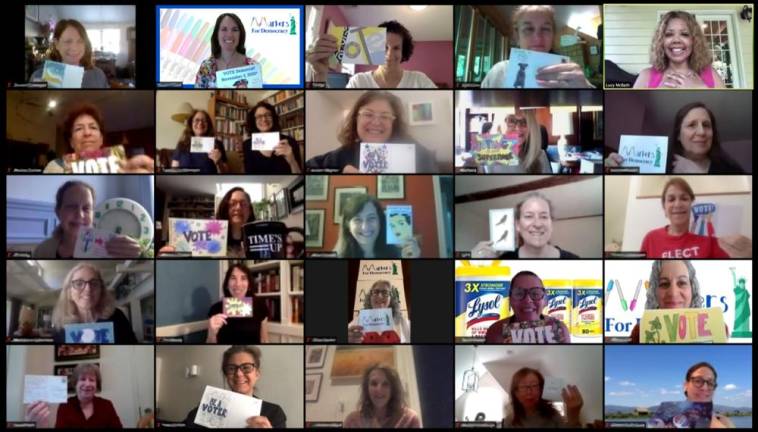They Write Postcards, Don’t They?

About a year or so ago, I walked into Le Pain Quotidian on Lexington and 88th, and noticed a long table filled with women. They were busily reaching into cups of colorful magic markers and then writing on cards. I figured it was a school-related thing, but there were no kids anywhere. I asked what they were doing, and that is how I met the Markers For Democracy.
In 2018, a quartet of NYC women were feeling incredibly anxious about what was going on politically in the country and decided to take action. Ellen Bender, one of the “founding mothers,” says she grew tired of watching Rachel Maddow, growing angrier by the moment, and feeling helpless. “Instead of throwing the remote at the TV, I decided to pick up a marker,” she says. To start making magic, they began meeting two or three times a week at LPQ, as it’s often called, to write postcards — remember those?
The cards were addressed to Democratic voters around the country whose districts were facing upcoming elections. Since then, some 55,000 cards have been authored by MFD members, as well as generating a newsletter, book groups, a Facebook page, copycat groups in other states, and more.
“Postcard writing is ‘entry level activism,’ says Bender, “a way to reach not only voters but to inspire volunteering in their communities. It is also something that those of all ages, from all places can do. My mother and her friends are in their 80s, and they are writing away.”
Obviously, much changed when Covid-19 hit, but MFD has not only veered virtually, its impact has been expanded. The writing continues, but it takes place while the women Zoom with candidates or political persuaders (such as Square One, which seeks out and endorses potential candidates) who no longer have to travel to New York. Rep. Lauren Underwood of Illinois, Rep. Lucy McBath of Georgia, and Rep. Haley Stevens, of Michigan are among recent visitors. These are not fundraisers, per se, but the chat room always advises where to send contributions. As one example, MFD contributed some $30,000 to help flip Virginia’s legislature.
“You guys give me hope and let me know I’m not alone,” said Desiree Tims in her recent Zoom appearance. An African American who comes from a family of sharecroppers, Tims is a leading candidate for Congress in a formerly red district in Ohio. “Postcards are indeed an effective way of making a point,” adds New York City Council member Ben Kallos, who Zoomed with the women to discuss a future run for Borough President. “The normalizing and popularizing of virtual meetings have created a whole new group of activists who are very effective. Makers For Democracy is one of those groups.”
Along with resistance in the streets, another movement that has been revived is Grassroots, and the old adage that all politics is local. Barack Obama’s first major talk a few weeks ago was on exactly that subject. It hit home with the post-carders. “We may have started with national races,” says Bender, “but we have written cards for school boards in Virginia, tax commissioners in Florida and so on. We’ve been educated to the idea that it is the mayors and city council members who have the most impact in our daily lives.”
One who was convinced is Susan Tilson, who had just quit a job when she first learned about MFD. “I was looking for ways to get involved,” says the Harvard-educated lawyer and mother. “I went to one of their events, to hear about how critical local and state elections are, and I was inspired.” Now, Tilson is the zoom “techie,” muting and unmuting all the meetings. “We have moved seamlessly into this new platform,” she says.
Alice Scovell, a lawyer and writer, joined the weekly meetings in 2019. “It just felt so good to be doing something at this time of Democratic crisis,” says Scovell. “The women are all educated, accomplished, and politically active and we’ve become a supportive caring community. MFD has made this time much more bearable for me.”